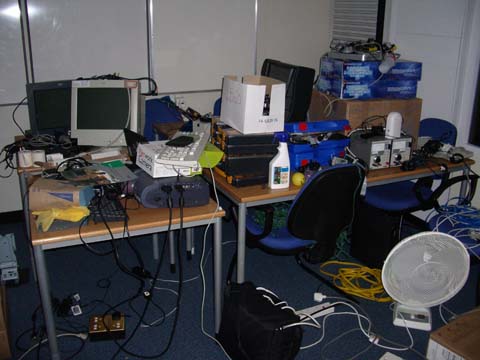Last night the BBC child of our time programme started. It is about the lives of a set of kids that the BBC are following/stalking throgh their lives from birth. The kids are now 5 or 6 years old. The programme itself is fascinating, especially having a 2 1/2 year old and seeing where things are heading.
However the phrase that struck me was about “Flow”. They were trying to measure the kids various amounts of “Flow”. I had not realized this was a psychologists term, though I am well aware of the principle. Flow is what happens when your mind is challenged by something and you are so engaged in the activity that time passes and you dont want to stop. We all need an activity to get Flow. Hobbies are usually what we consider as a way to get Flow, but for many of us in this sort of techland our jobs also give us Flow. For the programmers/hackers amongst us do you get ‘Flow’ when you are solving a problem, and you just “get in the zone”, “focus”. I find it also happens when I enthuse to customers and collegues
For me the emerging tech stuff, and all things around this business catch my interest and make it less of a job. Obviously video games also have the same effect on me.
I have recently been introduced to an ARG (Alternate Reality Game) called perplexcity thanks Gareth! This game you buy/trade puzzle cards, each card is a simple or very very complex puzzle, it mixes web, with pen and paper and the different styles of puzzle means that different thought styles are needed. My wife and I have realize that this has given us a combined “flow” as (apart from the BBC programme mentioned) we had the telly off and were trying to solve some of our puzzles. You start at 8 pm and before you know it it’s midnight.
So for me go with the flow used to mean not bothering and meandering along, not it means find a challenge and loose yourself in it as that feels great, either work or home.
I am not sure whether the nature of the tech industry attracts a certain type of person with a certain amount of “Flow”. The eclectic mix of technologies and the art of putting it all together, tinkering with settings, producing complex technical architectures all have a fascination for many of us in Hursley.
Hursley’s Pervasive Lab
Here in the depths of Hursley’s D-Block we have a pervasive lab. The lab is used to show lots of cool bits of technology that’s normally carried, attached to, or embedded in people and sometimes even animals. The clever bit (and the thing that makes it different from lots of other pervasive technology labs) is that it’s all connected together via some of IBM’s middleware software. That means that new bits of kit can be integrated into the lab really quickly. It’s normally a matter of configuration rather than development.
The lab had been overflowing with toys and needed room to grow. So before Christmas, some new furniture arrived. This meant that a big tidy and a rebuilding of all the kit was in order. Mid-clean, the lab kind of looked a little messy, I hadn’t realised how much stuff was actually in there.

By the end though, it was starting to look pretty slick. We have some snazzy new signs and benches. All the kit will soon be up and running and I’ll try and write about some of the stuff we have in here.

Game On in 48 hours
At http://lucidion.uwcs.co.uk/gce/2005/ you will find the entries that several teams from Warwick university made in a 48 hour codathon. The aim was to produce a decent quality game in 48 hours straight one weekend. I was asked to be a judge as our university relations (hi Yvonne) looked me up our internal directory and found I had been a serious gamer for many year and some experience in creating games quickly. It might be worth mentioning that there is a good book on amazon “Got Game: How the Gamer Generation Is Reshaping Business Forever ” for those people that maybe dont take gaming seriously.
Anyway, the games, and my ramblings on the games can be found all at the URL above. Enjoy
Dont forget to look at gametomorrow where we discuss the future of this type of entertainment
Ian Hughes (Emerging Technology Hursley)
Fund Raising Baking Day
I organised a fund raising ‘BAKING DAY’ for charity at work yesterday (in Hursley) to raise money for Children In Need. It was a brilliant day, so many people brought in home-baked goodies, cakes, muffins, cookies, biscuits, brownies, fudge etc and we sold them ALL. We raised quite a lot of money and had a fun day :o)
We counted the money yesterday and added the UK tax return thingy (if you are a UK resident), and it came upto just under £300. However we still have a couple of games and raffles that we haven’t collected the money for, so I will update you with our latest funds raised soon.
To see photos of what my colleagues and I baked please check out my pics.
Here is an example:

—————————————————-
Who We Are Helping:
Children In Need is an annual event that raises money and gives it to charities and projects that work to improve the lives of children and young people throughout the UK.
The donated money goes towards many things including helping children with severe physical disabilities, helping underprivileged children while their mother receives treatment for a life-threatening medical condition,
looking after children with cancer, paying for therapy sessions for sexually-abused children, paying for counselling sessions for children affected by violence at home etc.
It’s Coming
At the moment almost nobody uses Linux on their desktop; even in Hursley. Windows is everywhere but in the short time that I have worked here (~ a year), I have noticed a difference! Linux desktops are definately increasing in number.
I certainly wouldn’t recommend that most people install Linux, Windows is (in my opinion) currently better for the average desktop user. If you split computer users into four broad types then I would suggest that some of them might look into Linux:
- Complete Novices: This type of user is going to need some hand-holiding and what they use should depend on what their friendly “expert” is comfortable with. If my Gran got a computer, I would install Linux – I’d set it up for her and have a couple of icons on the desktop. She would use those and not dream of changing the setup or installing new hardware without my help – Linux would be ideal, I wouldn’t have to worry about viruses etc. and I’d be comfortable answering questions because I’d be intimately familiar with the system.
- Normal Users: The largest group of users and, at the moment, I think they should steer well clear of Linux. My Dad uses Windows, he might buy a scanner or a new camera, plug it in an expect it to just work. Windows is still way ahead in this area – hardware manufacturers often don’t support Linux, the market is too small and installing drivers can often be fiddly. Windows just works. Linux (currently) doesn’t – there is no competition yet (even the CEO of Redhat agrees).
- Experts: These are people who know and understand computers, but are different to my fourth category (geeks) because for them the computer is a tool. Most of this group of people use Windows, it’s easier to setup and certainly in the past would have made them more productive but I think that is on the cusp of changing, I’ll elaborate on this in a minute.
- Geeks: The difference between a geek and an expert is that geeks fiddle with computers for fun. Basically the only people who currently use Linux as a desktop OS fall into this category. Many geeks currently use Windows but have played with Linux on and off. I think many geeks will soon ensure they have access to Linux because I think this is where computers are changing most quickly. Even when innovation happens on other platforms, it quickly comes to Linux as well. Because Linux is evolving so fast little, tiny ideas are appearing that might take a while to appear on other platforms.
So although some geeks have been using Linux for a while, experts haven’t. For them it is all about the applications. They are arriving… Fast!
Applications, applications, applications
- Office:OpenOffice 2.0, AbiWord, Gnumeric, KOffice
- Internet: Firefox, Thunderbird, Gaim, Evolution, Nvu
- Graphics: GIMP, Inkscape, OO.org Draw, Sodi-podi
- Desktop Publishing:: Scribus
- Programming, GCC (and Mudflap!), Eclipse, Valgrind, Anjuta, KDevelop, Gambas
- Games::Battle for Wesnoth, Glest, FreeCiv,VegaStrike, Nexuiz, Vulture’s Claw, Armagetron Advanced, TORCS, VDrift, and MANY more
- Misc: Evince (Document Viewer (PDFs etc.)), MPlayer & Totem (Media Players), Beagle (Desktop Search), K3b (CD/DVD burner), GNOME & KDE (Desktops)
- One day: F-Spot (Photo Organiser), Diva & PiTiVi (Video Editing)
Total Cost of all these applications? £0.00
Given that people here at Hursley are either Experts or Geeks, I hope a few more might take a look at Fedora, Ubuntu or one of the other Linux distributions that include the majority of the programs listed above. There will be some initial setup pain but I think some people at least will never want to go back.
Hursley Fireworks
Hursley has a fireworks display every year to celebrate Guy Fawkes Night. Most of the people who work at the Hursley lab seem to go to it and it’s a pretty cool event. Should have some video online soon, but for now here’s a great picture that Rob took.

Hursley’s Japanese Garden
If you’re working in Hursley, sat a couple of centimeters in front of your screen, coding away all day, where do you go for a break? Well, Hursley has a Japanese garden, with a fish pond, fountain, trees and bits of modern art. It’s a cool place to get away from the technology and a bit of peace and quiet.

Here’s a quick video clip of the garden.
– Darren Shaw (Emerging Technology Services, IBM Hursley)
Good move by VMware
VMware have released the VMware player a cut down play only Virtual Machine that will run images created using their VMware Workstation, ESX and GSX products.
This is a clever move by VMware, the VMware player will be especially useful in the Enterprise market where pre-installed demo images of serious heavy weight middleware and other applications are an easy way of providing try before you buy demos. The availability of a free player will help encourage software firms to use VMwares fully featured products to create such demo images.
The player could also help in the uptake of linux as well, there are plenty of pre-installed Linux ISO images out there such as Knoppix to use in VMware. This provides a free means for users to try out Linux while still running their Windows setup.
‘Gmail’ becomes ‘Google Mail’ for UK users
Google recently announced that they are changing the service’s name here in the UK due to a trademark dispute. From today, all new invites sent to people in the UK will be for @googlemail.com (rather than @gmail.com) addresses. Nothing changes (so far) for existing users.

The Gmail logo.

The new Google Mail logo.
Why is this happening? The dispute with gmail.co.uk has been rumbling away for a while, and this seems to be the result. Google are still contesting their right to use the Gmail name in the UK, only now it’s being done in court.
What Working Group?
The web evolves quickly; not so long ago AJAX was the hot new thing and now it is increasingly main-stream. Predicting the next big thing is very hard but I think one new development in particular is not on people’s radar in the way that I would expect. The WHAT-WG (Web HyperText Application Technology Working Group) is coming up with a set of specifications that should allow Web Apps to be richer and faster to write. Importantly they are ensuring that new features degrade gracefully in older browsers (primarily IE6) so authors don’t have to wait until the internet population as a whole have upgraded from legacy browsers before using cool new technologies.
The group is backed by Mozilla and Opera so we shouldn’t have to wait too long for browsers that take advantage of these new features (Ian Hickson, the spokesperson for the group, has worked on Mozilla/Firefox and Opera and has just been hired by Google). These new specs – if done right – will make all our lives easier so I encourage any reader who is experienced in writing web applications to check out the draft specifications and to suggest any good ideas that might spring to mind. This working group may define the web of tomorrow – the more useful input that it gets today, the better!
